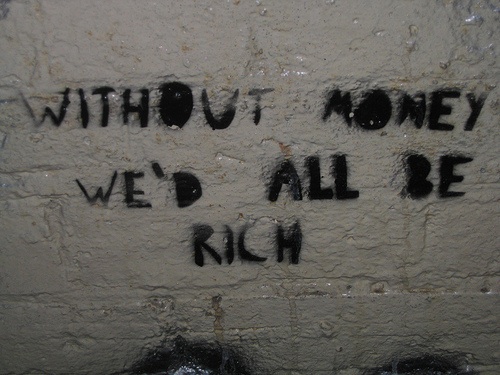

On one of my reading binges last year, I came across the book Your Money or Your Life by Joe Dominguez and Vicki Robin. It's actually funny that I'm referring to it now because if I remember correctly, I didn't really like this book, but I find it worth mentioning today because it brought to light an interesting concept for me—the concept of money. I know you're probably thinking how could I have possibly have just been exposed to the concept of money after reading that book; after all, I had to use money to purchase it. I would counter, however, that just because we are acquainted with money on a daily basis doesn't mean we understand what the concept of money is. In fact, if I asked exactly what money and its uses were, I think a great deal of people in this country couldn't give a straight answer. What on earth is money and just how much is it worth, anyway?
***
The best definition I've come across for money is the economic definition which state that money is "a store of value". What this means is that money is supposed to be a place holder, an IOU, or an indicator of the value of the entity expended to get the money in the first place. When I say "entity", this can mean anything from the amount of hours you spent working to the value of an object sold. My intent is not to make this blog post an economics lesson, but in short, if I sell an apple, the amount of money I receive for it serves as a place holder for the value of that apple. Because of the current value of apples, you wouldn't expect me to be able to trade an apple for, say, a Mercedes, which is precisely why an apple only cost maybe a dollar. The fact that I can roughly get one dollar for an apple and not one thousand is because money is supposed to be an accurate indicator of how much that which is exchanged for it, is worth.
Notice in that last sentence, I said money is supposed to be an accurate indicator of how much stuff is worth. Where I think this "store of value" concept gets fuzzy, and what the book Your Money or Your Life rightly pointed out, is when we take into account the fact that we trade not only apples for money, but that we also trade our time.
How much money is your time worth?
If I were to ask you that question, chances out you'd probably tell me a figure based on how much your currently make at your job, or if you're an entrepreneur or self-employed, maybe you'd give me the rate you charge based on your expenses and how many hours you have available to work. This is all fine and is a normal, perfectly practical answer, but what if I asked you how much it would cost to get that original time back? That is to say, if you trade an hour of your time for $14.50, will $14.50 buy you back an hour of your time?
That might seem like a ridiculous question, but remember, money is supposed to be an accurate store of value. If I run out and buy a Mercedes for $37,500, in the purest sense (excluding depreciation and all that jazz) I should be able to immediately sell it and roughly get my $37,500 dollars back. Both the money spent and the luxury car are supposed to represent the same amount of value in our economy. Unfortunately, this very simple principle doesn't hold up when it comes down to storing the value of our time because, unlike a Mercedes, I can't use money and the value it holds to purchase my time back. Time is finite and I can't get it back because I only have one life to live, and my life is both precious and priceless.
So what am I saying here? Should you immediately quit your job just because no amount of money is worth your time? No, I'm not saying that at all; I'm saying all of this to bring awareness to the fact that though you can't use money to accurately value time, you can use money to purchase other things, and the other things you purchase say a lot.
For the most part, we all have to start off on the "give time, get money" treadmill to ensure that our basic needs are met. I think most of us are in this current phase in our lives, and for the time being, there is nothing wrong or dishonorable about this. We all have to do what we all have to do. The critical shift in thinking and the key for getting off this treadmill, however, comes when we realize that since money is incapable of accurately storing the value of our time, then perhaps we should work towards separating our time and our ability to earn money altogether.
The above principle, boys and girls, is what separates the wealthy from the ordinary American who will continue to trade their priceless life for money until they die. The only way we can escape this is if we set up a system that will routinely ensure that we have enough to cover our needs without having to run out and trade time for more. How can we do this? Crazy simple—trade your money for things that will produce more money either now or in the future, not less. In fact, that is one of the only two choice we have. The unfortunate reality is that the majority of us spend our money and time on things that will not be worth much of either when it's all said and done.
For instance, if I go to the mall and buy some expensive clothes with money that took me 16 hours to earn, not only will those clothes probably not be worth much in the not-so distant future, but I'll have to go back to work for another 16 hours just to make up for the money I spent. If I work really hard, however, and buy a house with the money it took me 5 years to earn, not only does that house have the potential to earn me my money back either by appreciation or rental income, but that money will not cost me any additional trading of my time—in fact, it just might free me from trading my time for money indefinitely.
Though the above was a super simplified example and I'm sure many of you will point to the recent real estate crash (another conversation all together), the beauty of this is that we don't have to look towards complicated things like real estate just to make our money more effective. Even a dollar saved in a savings account will be worth more tomorrow than it will be today, and I wouldn't have to trade any additional hours of time just to cash out on the value, which is the whole point. Savings in virtually all forms is the foundation to leaving the work/earn treadmill forever.
Just because I encourage us to save doesn't mean I believe you shouldn't ever buy something nice for yourself or indulge in something material just because it's going to cost you in time and money. Life is about enjoyment too and a few material possessions can definitely aid in that enjoyment. All I'm saying is the next time you go out to purchase that material item, realize that it is going to cost you—not only in money and time now, but in money and time later. Next time you get your paycheck and you have the choice to save some for your future or to spend most of it at the mall, ask yourself: How much is YOUR money worth, anyway?









.png)

